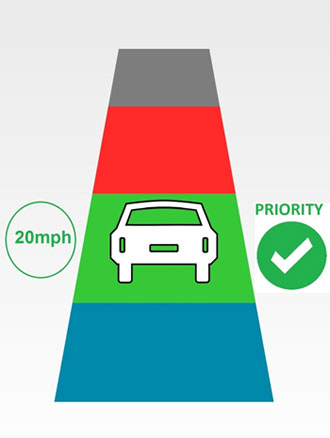April
Newcastle motors ahead in the race for a fully automated transport system

New technology which allows traffic lights to ‘talk’ directly to motorists to inform the way they drive is being rolled out across Newcastle.
In the first pilot of its kind in the UK, the communication system warns drivers of obstacles on the road, gives key road users such as NHS vehicles priority at lights, and helps drivers adjust their speed so they can pass through a series of lights on green.
Led by Newcastle University in collaboration with Newcastle City Council, Siemens and North East Ambulance Service, the aim is to improve safety and reduce congestion and pollution by helping motorists to drive more efficiently.
Linking an in-vehicle communication system directly with the city’s Urban Traffic Management Control (UTMC) centre, the infrastructure will ‘talk’ directly to motorists, giving certain vehicles priority at junctions.
Better journeys for patients
Initially, the system has been fitted to non-emergency North East Ambulance Patient Transport Service (PTS) vehicles based at the Freeman, part of the Newcastle Hospitals NHS Foundation Trust.
PTS vehicles are used to take patients to and from hospital appointments, such as dialysis and cancer treatment. NEAS are piloting the technology to see if it can create a smoother journey for patients while at the same time, helping to cut the trust’s fuel bills.
“Traffic management systems are already in place across the city to improve traffic flow but what’s unique about this trial is that we will be giving personalised information directly to the driver,” explains Phil Blythe, Newcastle University’s Professor of Transport.
“For example, the system might advise a driver that if they travel at 24 miles an hour they will hit the next four sets of traffic lights on green. In more congested areas or particularly busy times of the day, then vehicles on key roads might be given priority in order to keep the traffic flowing.
“These are exciting times in the world of transport and here in Newcastle we are leading the way - taking the first step towards a fully automated system with intelligent infrastructure and, eventually, driverless cars.”
Smart city of the future
Building on the University’s world class research in urban sciences, the project will play a key role in developing Newcastle as a smart city of the future and an exemplar of sustainability.
“This is about optimising the network,” explains Ray King, UTMC manager. “The NHS vehicles are transporting patients to hospital for treatment and they don’t want to be held up in traffic unnecessarily, delaying appointments for other patients and wasting taxpayer’s money.
“If we can speed up their journey, giving them priority at lights where appropriate, then it not only reduces fuel bills and delays but also improves patient care.
“The aim of the pilot is to show it could work – that giving priority and personalised information to drivers can have a significant impact on how we drive and the conditions on our roads. This is just the first step.”
As well as the priority system, the team are also implementing:
• A Forward Collision Warning, which notifies drivers of obstacles on the road such as an accident, broken down vehicle or even just stationary traffic
• A Red Light Violation Warning, which tells drivers when someone on the road ahead has jumped a red light
• And an Energy Efficient Intersection service, which advises the driver of the best speed in order to pass through a series of traffic lights on green.
First trial of its kind in the UK
For the first wave of the pilot, 20 traffic signals have been equipped with the technology on key junctions around the city centre. Fourteen vehicles will be equipped with the priority technology with the potential for further vehicles to be equipped as the trial progresses.
Paul Liversidge, NEAS Chief Operating Officer, said: “As the region’s only public sector ambulance service, improving the experience people have on board our vehicles is at the heart of what we do.
“Trialling technology like this in a real setting gives a more valuable understanding of how it could add more value to ambulance services throughout the UK.
“Ambulance services across the country already employ a range of advanced GPS technology to help guide us through traffic. This new system has the potential to further improve how efficiently we run the service, ensuring we get to our patients on time and they get to their appointments on time and reducing our carbon footprint.”
Compass4D is a 10M EURO project involving seven European cities - Bordeaux, France; Copenhagen, Denmark; Eindhoven-Helmond, Netherlands; Thessoloniki, Greece; Verona, Italy; Vigo, Spain, and Newcastle, UK. Other key partners include Siemens and Volvo and the project is co-ordinated by the European Road Transport Telematics Implementation Coordination Organisation (ERTICO).
Part of the research will be carried out in the University’s DriveLAB – an Electric Vehicle kitted out with eye trackers and bio-belt which measures driver behaviour. Used in conjunction with the new SatNav technology, the Newcastle University team will be able to analyse how drivers respond to the information they are given.
Professor Blythe adds: “This will be the first trial of its kind in the UK, putting the City at the forefront of new and innovative thinking as to how emerging technologies can help us better manage our increasingly congested roads in the future.”
For more information contact Louella Houldcroft, Senior Communications Manager, on 0191 2085108 or email Louella.houldcroft@ncl.ac.uk
published on: 3 April 2015
